"It's an entirely different world"
In this interview, geophysicist Alicia Ronacher talks about her life as a researcher in Antarctica, curious penguins, packing her suitcase for a winter hibernation in one of the coldest places on earth, the last tomatoes on her plate, the many colours in the eternal ice, auroras and singing icebergs.
25 May 2022
Hi Alicia, good morning. Things are looking pretty technical, pretty scientific in the background.
Yes, I went to the lab for our Skype conversation. I didn't want to Skype in my room in case someone else was sleeping next door.
How cold is it out there right now where you are? And how warm are you where you're sitting?
It's a pleasant 20 degrees in here. That's our average temperature. And outside — I must admit, I haven't looked at the thermometer yet this morning. But yesterday, it was minus 25 degrees.
Oh, that's relatively mild for Antarctica, isn't it?
It might even be milder today because whenever we get a low-pressure system, the sky is overcast, and it gets warmer. And then it can even be that we only get -16 or -18 degrees. But two days ago, when it was pretty clear, we had -35 degrees.
It's Wednesday, 10:00 a.m. What do you usually do at this time?
It's 8:00 a.m. here, two hours ahead of Germany. What would I be doing now? I would probably be having breakfast. Before that, I usually have a quick look in the office to see if all the instruments are running or if anything is out of order. We have a lot of monitors that show us that data is coming in. You're in a constant state of excitement here, and you want everything to run smoothly. That's why the first thing you do when you get up is to check that everything is working. Then I check my emails briefly, and after that, I'd start my routine. That changes a bit every day because I take turns with my geophysics colleague Benita, so we don't have the same daily routines. Today, for example, I would have looked at the earthquake data. We measure the shaking in the ground at different places. Today I would have checked yesterday's data. I check out when earthquakes occurred, locate them, and determine at what depth they occurred.
Do you look at earthquakes in your area or earthquakes happening worldwide right now?
We can actually measure earthquakes all over the world if they are big enough. For example, we measure earthquakes in Japan or Fiji. On our doorstep are the South Sandwich Islands, a very active earthquake area. Of course, other research institutes will have already detected these large quakes. But we also find earthquakes here that are not yet cataloged and would otherwise be "lost". And these are partly the Fiji and South Sandwich quakes. We see many that would be overlooked by large global networks because the quakes are simply too small.
Let's come back to your exciting work in more detail later. Is there an everyday life in Antarctica at all? And does it ever feel like everyday life, sitting in Antarctica?
What amazes me is how quickly you get used to it. In the beginning, everything was new, and I could hardly understand what was happening. But now everything has settled in. Getting up, having breakfast, and going to the office, even if it's just across the corridor, is like being at home. And there were days I didn't take a step outside because there was so much to do. But fortunately, that's rare. We often have additional projects or go to measuring stations to pick up data or repair instruments. But Markus, our meteorologist, for example, really does have a tight schedule and observes the weather every three hours. Then, in the evening, our air chemist takes over. That's a stricter schedule than for the rest of us. But we do all meet for dinner and have a relaxing time together.
And is there a weekend?
There is definitely something to do seven days a week. But we try to do less on at least one day or one afternoon, doing only the most essential tasks. That's when we take the time to see the penguins, for example.
You spend the winter with eight colleagues at a research station in the eternal ice. Why do you do something like that? What attracts you to this project?
I think for me it was this special place: Antarctica. It's an entirely different world. Through my geophysics studies, I could already take measurements in many places around the world. It's exciting when you take the measurements yourself and can be there. But Antarctica is something wholly different and new. Because in addition to the scientific aspect, there is living together with eight people in the station. You live together for a whole year, you're on your own, and you make something good out of this joint project. But, of course, that can also go wrong. After all, you don't know each other. August 1, 2021, was the day we all met for the first time. In Bremerhaven. We were all very excited. We had no idea who was coming. And I'm just lucky that it could not have turned out better. I'm so happy with the team.
In your wonderful blog, we can read about the arrival, getting to know each other, and the preparation time in the shared flats in Bremerhaven. That was an adventure in itself. It must be a bit like being shot into space together, isn't it?
I think you get away from the ISS faster than from here. (laughs) We also have a medical study examining what happens to us in isolation. But of course, we can get out into the open air. It's not as confined as on the ISS.
Does it feel like you're sitting at the end of the world?
Good question. Yes and no. The fact that we can communicate super easily with home via What's App or other messengers sometimes makes it very close. But in terms of what's happening, we're sometimes very far away. After all, we came here from a completely different world. Of course, you still hear about everything on the news, but it still feels like there's a vast distance. And it's also a bit surreal. We have our everyday life. We have other important tasks that are super immediate for us here. That's really nice. You always have to do some bureaucratic stuff when you're at home. And here you say: 'OK, we have to set up the next measuring station now.' You go out. You're much more determined. Or if something is broken, it has to be repaired immediately. It's all much more direct.
Does it feel good that it's much more focused there? Is that also a form of calming down, relaxing, and finding oneself?
Well, it's certainly a bit different for everyone, but for me, it's pretty cool because you can work off your to-dos and always be outside. We operate within a well-defined framework, but you have a lot of freedom to create something within that framework. You just don't have the choice between twenty thousand things, but only between five. So you have freedom in miniature, so to speak.
Is there boredom?
Not really. (laughs) For one thing, because there is so much to do. It's also always exciting when we go to an outpost. There are measuring instruments, for example, where the batteries have to be changed, and the configuration has to be altered. That's always a bit tricky because you have to connect a laptop. When you operate the computer at minus 30 degrees, your fingers get cold quickly. But the good thing is that you also have to dig a few cables out of the snow. That usually warms everyone up again. If you don't feel like doing anything, you don't get bored. You can drop in on the others or read a book. Sometimes we watch a film, play billiards in the evening, or prepare for the next birthday.
Can you describe what the station is like? Is it like being in a shipping container — very sober, very technical? Or is it more like an ordinary institute building so that you don't even notice that you are on an Antarctic research station?
It resembles a mixture of a youth hostel and a research station. There's this funny blue plastic floor here with little knobs sticking up. I think they also have these bumps in nurseries. The lounge we have is super cozy. Because the station is run by a shipping company, all the terms we use are from ship jargon. We have the mess, not the dining room, we have different decks and no floors, and even the wind speed is always given in knots. That means we are our own little ship, so to speak. The station stands on stilts. In the middle are the living and working space containers. And around the outside, there is another hull of about two meters. This provides air insulation so that it doesn't get quite so cold. You can't really tell that the living containers are containers, and they look like regular offices.
And your rooms? Can you make yourselves comfortable there, bring your own personal things — a cuddly cushion, pictures — or how should we imagine it?
The Alfred Wegener Institute allowed us to bring lots of things with us. For example, fairy lights or scarves that make the room cozier are very popular with us. When we moved in as new winter residents, there was major furniture shuffling. There is furniture in every room. A lot of it was moved into an empty room, and other furniture was added, cupboards were moved, and everyone made the room their own. Our electronics engineer Micha even changed the lighting entirely and installed a lot of indirect lighting.
The polar night started around 20 May. That must be quite a strange experience. How does it feel?
I didn't know how to imagine it either. The light is not gone immediately. It gradually decreases. I'm glad that my need for sleep hasn't changed much so far. I can get up in the morning and go to bed in the evening without any problems. But when you see the sunset as early as 2pm, it's weird. So far, though, I think it's just beautiful. We have a very long twilight that bathes Antarctica in beautiful light. And you get much more of the starry sky and the moonlight. I see the aurora australis every now and then, but I'm hoping they'll get more intense.
 How did you get to Antarctica in the first place? By plane, helicopter, or ship?
How did you get to Antarctica in the first place? By plane, helicopter, or ship?
During the preparation time, it was unclear when and how we would travel. Then the decision was made that we would fly by plane, just like the other scientists before us. And only when we were no longer together in Bremerhaven were we told that we'd fly one day earlier than planned. To continue our journey with the research icebreaker Polarstern. The Polarstern was on a research cruise in the Southern Ocean and had just had a crew change in Cape Town. Since they were heading for Antarctica anyway, they took us with them. The crew had to squeeze closer together because of us. But that was no problem. They welcomed us warmly. It was super nice.
Traveling by ship is an entirely different experience. You have much more time. You usually fly to Cape Town and from there by plane to Antarctica, and suddenly you've arrived. But we had a lot of time to sense the colder weather, to observe the first ice appearing. The first penguins were sighted, and then we saw the edge of the ice shelf and the station with binoculars. The last few days on the Polarstern somehow passed like a dream. We packed our things and waited for the helicopter to fly us to the station. And there we were: in Antarctica. It took me another two or three days to understand what was happening.
Was it hard to pack your suitcase?
Oh yes, it was a huge thing. We actually packed in September because that's when our boxes had to go to port storage. It was all super tight because we had only met in August, were at a mountain course in the Alps for a week, and then the deadline for the boxes was relatively soon. Then you had to go home again because you didn't have everything you wanted to take with you in Bremerhaven. I then had to transport them up north. Of course, you stand there and ask yourself: What do I need? How many T-shirts and sweatshirts? Should I bring sports stuff? What books do I want to bring? Shower gels, toothpaste, and things like that are ordered by the shipping company, though. If you want something special in this area, you must bring it yourself. Otherwise, you will smell the same all year round.
What about the food? Is everything supplied for the whole year, or do you get a new delivery after three or four months?
In the Antarctic summer, there are different delivery options. The bulk of the food comes by ship. But sometimes it is also delivered by air. When the "summer guests" were picked up, there were fresh fruits and vegetables on the last plane, and we jumped at them. (laughs) Unfortunately, all of that has long since been eaten. The melon is gone, and the tomatoes are out. There are still apples and oranges. That will have to be enough. Over the Antarctic winter, however, we are out of reach, and the next delivery won't come until October. But our Chef, Werner, has everything perfectly planned.
Is Werner also the one who allocates, who then says: " Well, Alicia, there's no more than one cup of coffee today. Otherwise, we won't make it through the winter"?
Yes, just like that... (laughs) No, I think we have so much of most things that nothing will run out. In other words, we don't ration anything. If we run out of something, we improvise, and there is something else. For example, once there were tomatoes at dinner, Werner said: 'By the way, these are the very last tomatoes.' You were aware of that when you were eating, and we arranged them on our plates in an extra nice way. We also have a lot of food here that we can use to make something ourselves. We have two enthusiastic bread bakers among us. But after a while, you miss the fresh things a little bit.
Are there vegetarians or even vegans here?
There are two vegetarians and one vegan here, which is, of course, a challenge for Werner too. But Werner is super relaxed. We have lots of frozen vegetables. There is so much delicious food. I think I eat a lot more here than at home.
Is it dangerous where you are?
In some ways, of course, it is. If you're not careful, you can quickly get into unsafe situations. For one thing, the cold is dangerous, and if you lose your bearings in a storm, that's not so good either. But if you stick to specific rules, it's at least as safe or even safer here than at home. We have a good system here. We have a board where we put our names on a little piece of paper, noting whether we are outside or not so that people can look if someone is missing. And if we go further away, we put our names in a logbook, and at least two of us go. And we also have a survival box with us. It contains all kinds of things for emergencies: sleeping bags and tents, food, a cooker and, very important, spare gloves. We also never go out without a radio and GPS device. And, of course, we also learn. Initially, you don't know how best to bundle up, so you don't freeze or sweat outside. But with time, you get the hang of it.
Is everything white in Antarctica? What does the landscape look like when you look out of the window?
It's grey at the moment because it's storming. And then you can't see very far. On a clear day, everything is white outside. But still, there are many colors in Antarctica. For example, the icebergs' deep blue in Atka Bay to the north. And the sky is also incredibly colorful. Especially now, when we still have a little twilight or the sun has just set. It's an extraordinary display of color. The deepest orange mixes with the brightest pink. I think I will appreciate the sky much more after this time. The clouds in the sky are also quite impressive when illuminated in different lights. Ice crystals that drift across the ground when the wind blows are also quite beautiful. It looks like a river of snow that washes over your feet. When the sun shines on them, you get goosebumps.
And you take hundreds of pictures every day?
I don't have a very good camera, but others on the team are well equipped. Recently I took the camera of our air chemist, and I couldn't stop taking pictures. But of course, that also decreases a little. Once you've been there longer, not everything is so incredibly exciting or new. Still, I don't know how many sunsets I've photographed.
What is it about this peculiar fascination that Antarctica exerts?
There is something like polar fever. Many people are so captivated by Antarctica, and I can relate. It's just so different. And also very hard. Antarctica is a super hard place for an ordinary creature without a station. How the penguins do it is incredible. They breed in the polar night with storms and the coldest temperatures. It's impressive and therefore also so beautiful... I go into raptures.
When you go out on the ice, who or what do you meet — apart from the icebergs?
Our own footsteps, for example. (laughs) That's quite funny. You see your footprints, but the wind has blown the snow away. That means the footprints stick upwards as if you had built sand cakes. As for the animals: we rarely see seals at the moment because the sea is still frozen. But we watch the penguins relatively often. This is because they are on the sea ice in their colony. Penguins are curious animals, for whom we are also an exciting diversion. We keep our distance, of course, but the penguins also keep a close eye on us.
Apart from all that, you probably get a few seagulls poop on your head. But you don't have any more contact with the fauna out there?
That's right. But I find it absolutely fascinating that there are birds here. That was already so impressive on the Polarstern. In the middle of the sea, suddenly there are birds. Where do they come from? And here, it's also just so, so, so cold. And yet a few weeks ago, I saw flocks of birds flying by. And they are curious, too, circling over our heads or sometimes flying a meter or two past us.
What about whales?
We haven't seen any yet, but of course, they are there, and overwinterers before us have also seen them when the bay is clear. They are probably most often seen at the so-called north jetty. This is the mooring for the supply ship at the edge of the ice shelf facing the open sea. Our electrical engineer Micha is desperate to see an orca before returning home.
Do you notice that Antarctica changes your view of yourself, nature, the world, and the world you usually move in?
When I travel, I always appreciate what I have at home. Nature, all kinds of things. I find it incredibly beautiful and exciting to discover other countries. Still, whenever I return, I think there are also quite beautiful corners in Germany. The forests there, especially the trees, which are missing here. Before we left for Antarctica, we went into the woods, saying, "Take care, trees, we'll see you again next year." You learn to appreciate that much more, I think. And myself? I can't say precisely yet how my time here will change me generally. But especially in the isolation and the polar night, you sometimes react or feel slightly differently. Sometimes it helps to just sit back and look at the situation from the outside. I also notice that sometimes, for example, I'm a little more irritable than usual. That's just how it is; if you become aware of it, you can deal with it better. I think I observe myself a bit more than usual. And somehow, you are much happier about the little things.
Is there something you miss in the station and something you miss in Antarctica?
We are very well equipped here at the station and know that it is a privilege to be here. After all, there is so much to see in Antarctica. But nevertheless, I can think of a few things. I miss a bit here, for example, water where you can swim. Even though I'm not an absolute water rat, swimming in the lake is lovely. You think about that sometimes, mainly when friends write that they're about to head off to the lake. And I think I miss the green in nature. The spring. Lush meadows. Sometimes I think in the back of my mind: "Trees would be nice right now."
Compared to Germany, what strikes me here is that you have so many smells there. In the forest, you smell the wood, the moss. Antarctica, on the other hand, is simply odorless. You don't smell anything. Even penguin droppings don't smell in the cold. Apart from that, there is little we miss. We have a sports room, pool, and football table. We have a wide range of media, a server where many audiobooks are available, and then the library is the ice. We can't go to the theatre or the pub in the evening, but we have our lounge. We have even organized cinema evenings here, made tickets, put up film posters, made popcorn...
Who chooses the films?
It varies. We just had a football evening because we have two football fans on the team. But we also watched the Harry Potter films or Lord of the Rings.
You are a geophysicist. What is geophysics? What does a geophysicist do?
I didn't really know before I started university. I started studying geophysics because I found physics cool and physical phenomena super interesting at school. But I didn't feel like just chasing little particles. Then I heard about geophysics. I found the connection of exploring the earth through physical science fascinating. And I'm still very happy about my decision because it gave me a lot of opportunities. In geophysics, you try to look into the earth, for example, to find out how the earth is constructed, without drilling into it, so to speak. I think the deepest borehole that exists is twelve kilometers deep. That's a lot. But suppose you consider that the earth's radius is about 6000 kilometers. It's like not even puncturing the skin of a balloon. So everything we know about the earth's structure is ultimately known through geophysics. It's fascinating how deep you can look into the earth and what methods you can use. For example, you can shed some light by looking at how earthquake waves propagate. A good example is the earth's outer core, which is liquid. And we only know this because a particular earthquake wave does not propagate in liquids. In the earth's outer core area, these waves do not occur; therefore, it must be liquid. But sometimes, it's frustrating because you can't figure things out exactly. But if you use different methods, there are more pieces of the puzzle that make the picture clearer.
What can you research as a geophysicist in Antarctica that you wouldn't find out anywhere else in the world?
We have two — or even three — focal points: Seismology, which is the study of earthquake data or tremors. Then magnetics. That's where we look at the earth's magnetic field. And there is also an infrasound array. This can be used, for example, to measure explosions in the atmosphere, even over very long distances. Setting up and operating a measuring station here in Antarctica is much more challenging. Still, for the study of many phenomena, it's important to be distributed all over the world. It's a bit like a computer tomograph, where you are scanned from all sides to get a complete picture of your body. It is similar with our earth. If scientists are not everywhere, we cannot, among other things, check all the paths of earthquake waves. Or recognize all the traces left by nuclear bomb tests. You wouldn't think of such things at first, but that also falls within the scope of geophysics. Of course, the instruments here measure without us, but someone has to be there if something breaks. So we are something like the caretakers of the scientific equipment. For magnetics, however, we must take regular measurements because we constantly move on the ice shelf. And so is the earth's magnetic field. The magnetic poles, for example, change their position every day. It is conceivable that the north and south poles will swap places one day in the distant future.
How long have you been there now?
I've been here since January, so four months already.
Does time pass quickly?
Yes, it flies. I've gotten into the habit of writing down everything that's happened in the evenings. Especially at the beginning, in the summer season, there was so much going on, and everything happened at once. So I'm curious to see if that will change and time will slow down again. But at the moment, we are racing towards midwinter on 21 June. From then on, the days will get longer again. So you run towards it and think: 'It's almost half-time.
Are you already making plans for after Antarctica?
It varies. A few of us can go back to our previous jobs. For me, I honestly don't know yet. There might come a time when I look into it more closely, but at the moment, I find it so lovely here that I want to take everything I can with me. Then, when I'm back, I can worry about what to do next. We've already heard from the winterers before us that it's strange when everything hits you again, that you need time to get back into the swing of things. But we're also lucky that our contract — we'll be back in January or February — runs until the end of July. We also have follow-up work.
Finally, can people send you anything like letters, postcards, or parcels?
Actually, we are now cut off until October. But there is the possibility that my family will send me something for Christmas. But that won't arrive until October or November. So the mail first goes to the Alfred Wegener Institute, then forwards to the Neumayer Station.
Then there's a little thank you gift to unwrap for your Christmas party...
Actually, Christmas is not celebrated so much here. Our biggest celebration is midwinter on 21 June, observed by all the stations in Antarctica. So I'm really looking forward to that.
Thank you very much, dear Alicia. It was exciting and gave a great insight into your life and work there. Thank you for letting us share a bit of your Antarctic adventure. Take care of yourselves!
It was a lot of fun. I say thank you.
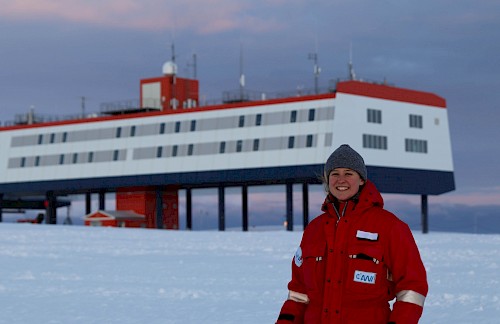
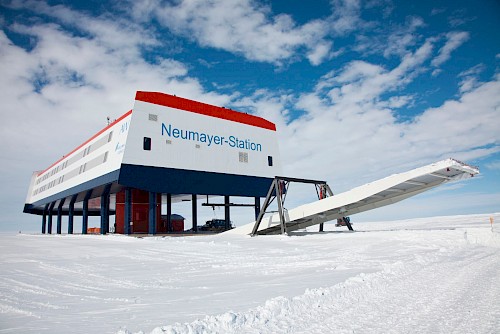

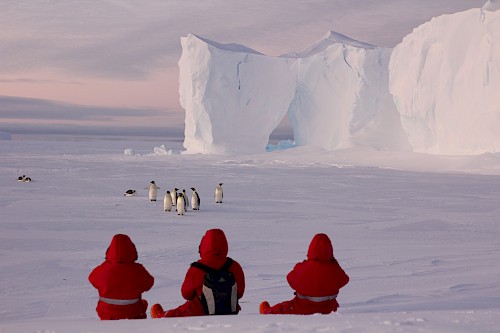
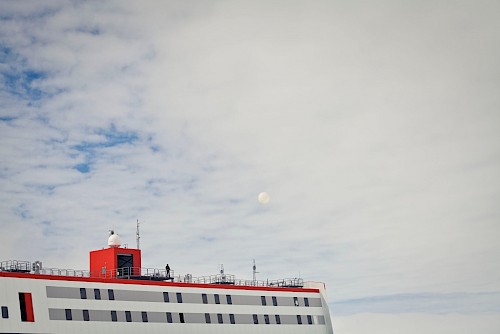
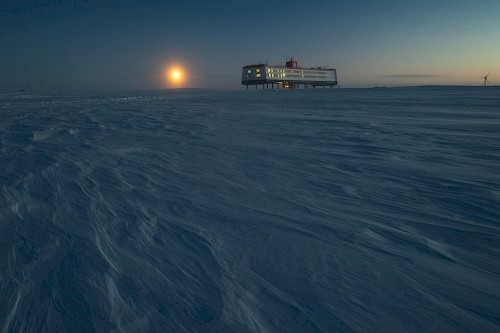
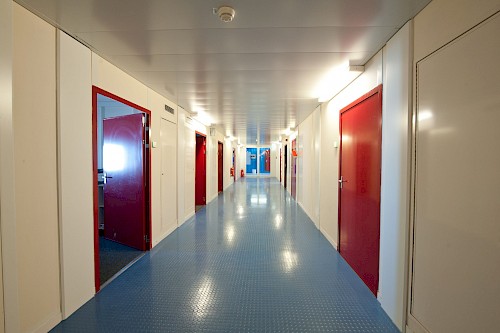
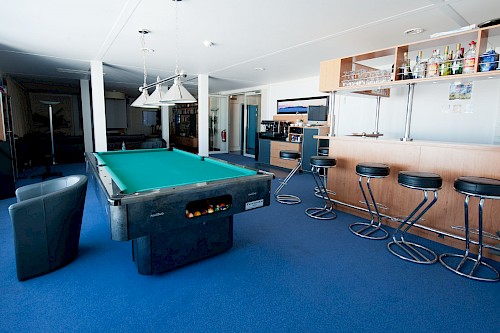
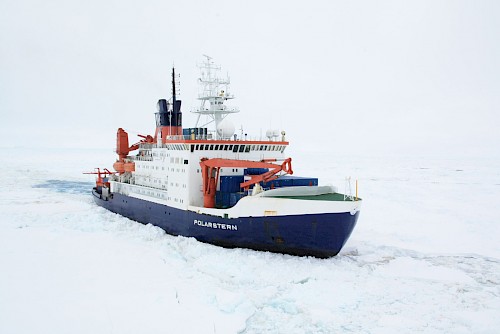
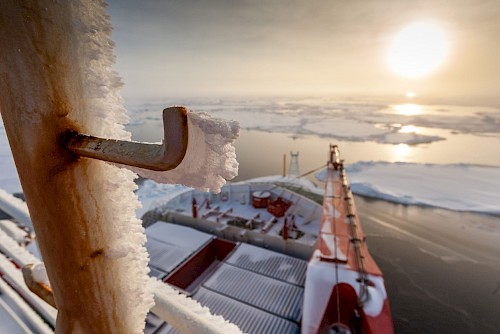
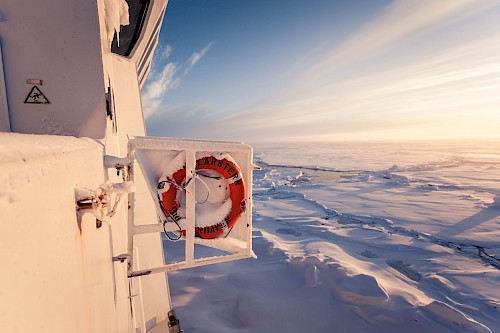
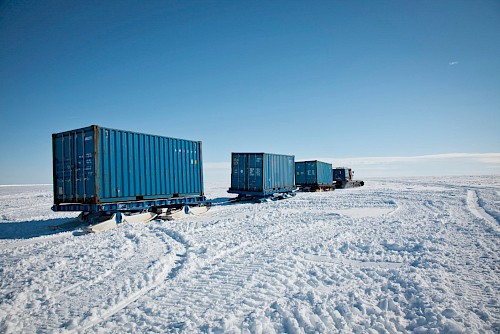
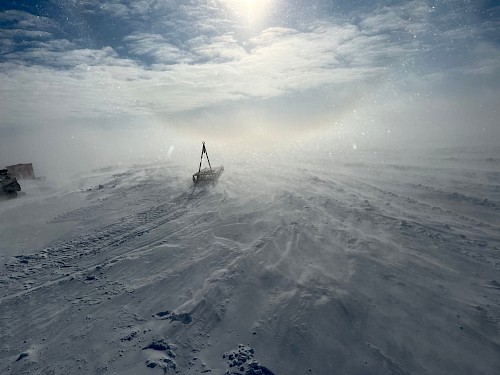
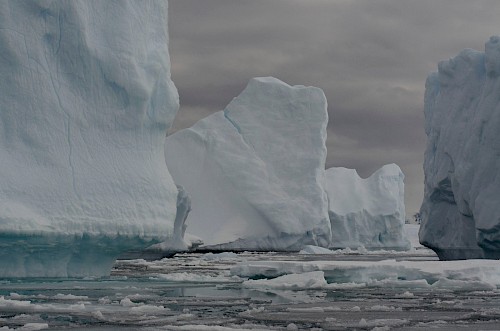
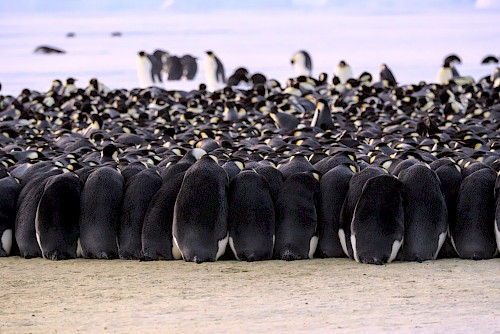
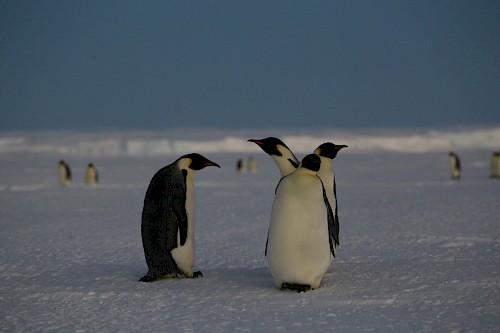
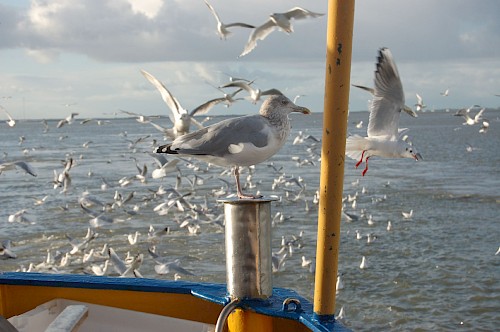
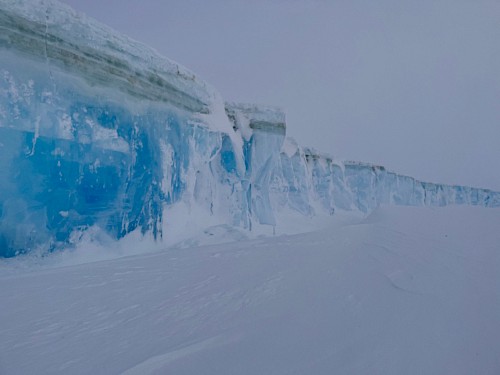


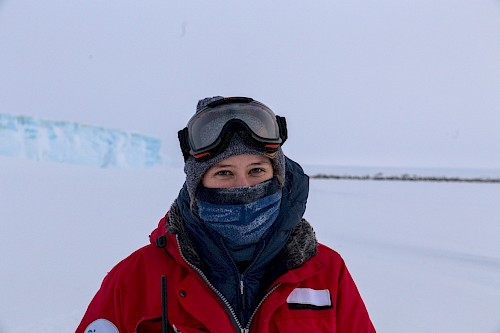
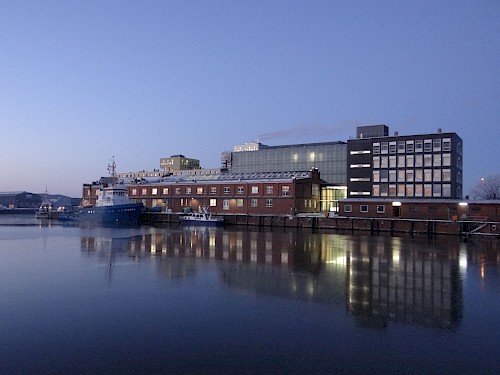
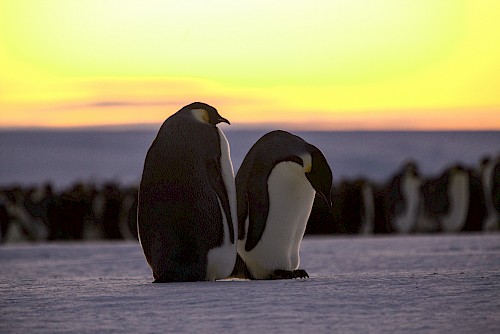
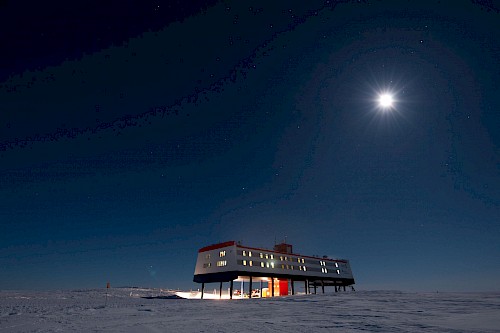
No comments
Leave a comment